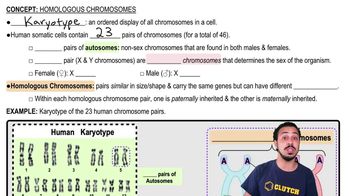Homologous Chromosomes definitions Flashcards
Terms in this set (8)
Homologous Chromosomes
Pairs of chromosomes, one from each parent, carrying the same genes but possibly different alleles, contributing to genetic diversity.
Diploid Cells
Cells with two sets of chromosomes, one from each parent, allowing for genetic diversity through different alleles of the same genes.
Genes
Units of heredity located on chromosomes, consisting of DNA sequences that code for specific traits, with variations (alleles) inherited from each parent.
DNA
A molecule that carries genetic instructions in all living organisms, composed of two strands forming a double helix, with sequences of four types of nucleotides encoding the information.
Chromosome
A structure in the cell nucleus composed of DNA and proteins, carrying genetic information in the form of genes, with each pair inherited from one parent, differing in DNA sequence but sharing gene loci.
Alleles
Variants of a gene found at the same locus on homologous chromosomes, inherited from each parent, contributing to genetic diversity.
Genetic Diversity
Variation in the DNA sequences of homologous chromosomes from different parents, leading to unique alleles and contributing to the differences within a species.
Crossing Over
The exchange of genetic material between homologous chromosomes during meiosis, leading to genetic diversity in offspring.

